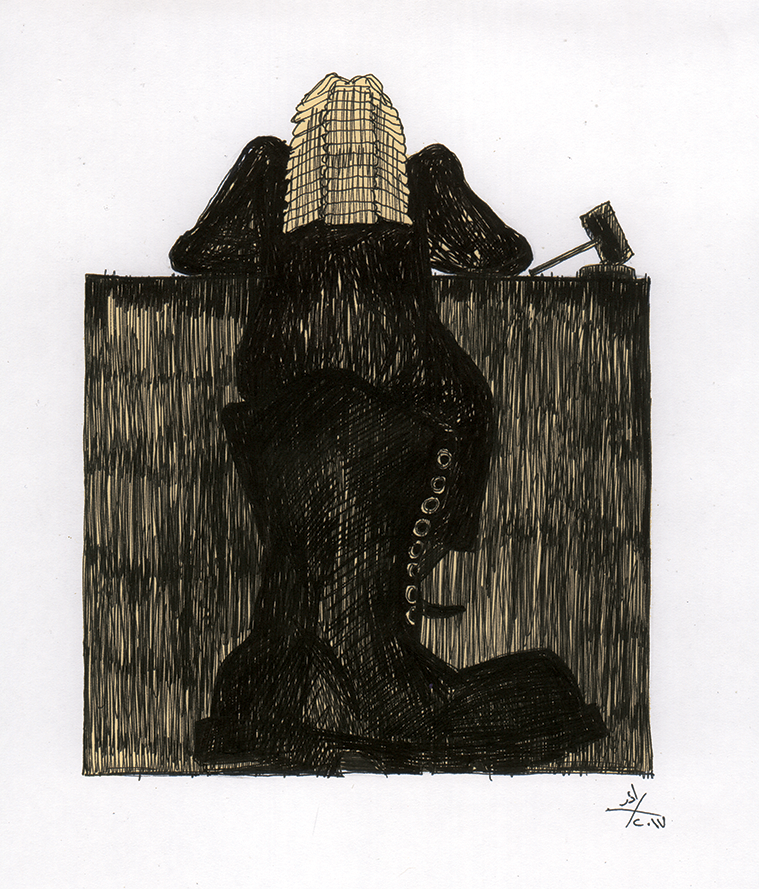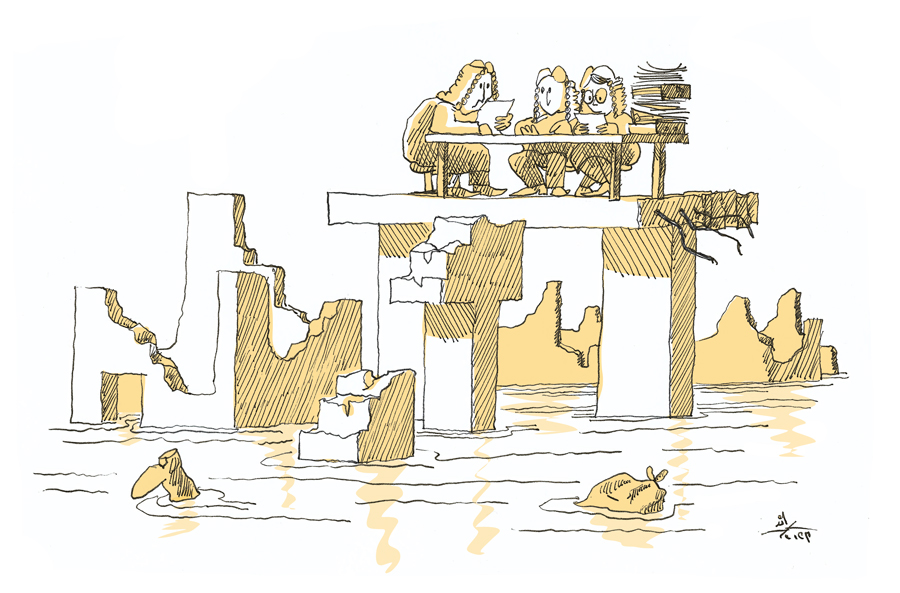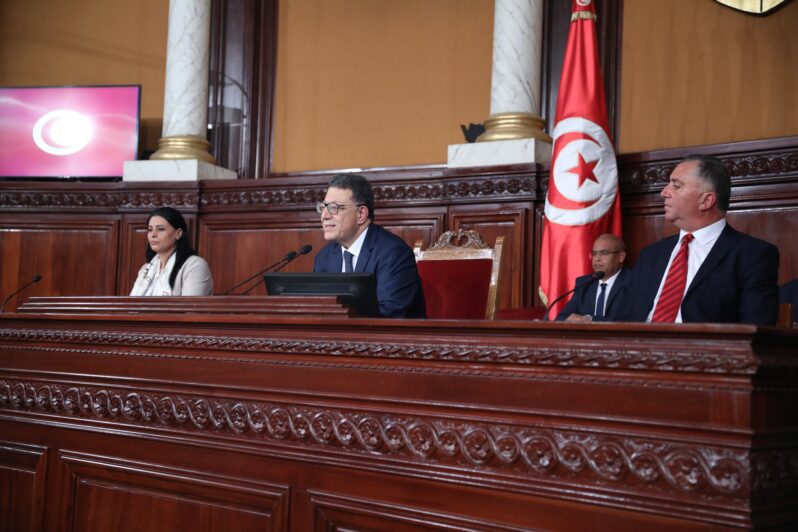Constituting Military Courts in Egypt: The Role of Constitutions

Egypt’s military judiciary has developed considerably since its founding. What began as disciplinary courts for soldiers and officers has evolved into its own specialized and comprehensive judiciary, with both criminal and administrative branches. The Egyptian Code of Military Justice regulates which crimes the military judiciary punishes. It also organizes the prosecutors and courts that try these crimes. The military judiciary, whose scope is not limited solely to trying members of the military, also includes judicial committees designated to adjudicate administrative disputes in connection with the armed forces.[1]
Military courts were first established in Egypt by the Code of Military Justice of 1893. Initially, most crimes brought before these courts were cases of a disciplinary nature, despite the law’s use of the term “crime” when referring to it.[2] The initial law was replaced by Law 25 of 1966, which is currently in effect. Debates about these courts have hinged on whether they are constitutional to begin with, as well as whether it is constitutional to transfer certain cases to military courts. Since the authors of Egypt’s constitutions have set out to legalize and protect these courts, various constitutional statutes have helped establish military courts’ jurisdiction, which has expanded to include cases that fall outside of their competence in normal circumstances––such as the prosecution of civilians.
Before 1971: Military Courts as Disciplinary Bodies and Exceptional
Egyptian constitutions before and after 1952 used the term “military trials” when referring to the military judiciary. For example, Article 183 of the 1956 Constitution specified that the law should “organize the arrangements of military trials and specify their jurisdiction as well as the characteristics of those responsible for justice within them.” The 1964 Constitution replaced “military trials” with “state security trials” while preserving the same text as the 1956 Constitution. According to some jurisprudence, the authors of these constitutions intentionally used the term “military trials”. They did so in order to limit the legislated scope of these courts to rulings on military infringements and crimes, without extending its reach to administrative disputes between soldiers and the armed forces, the prosecution of civilians, or the prosecution of soldiers for crimes that are not considered military in nature.[3]
This constitutional framing had an impact on the judicial scope of these courts. For example, the Court of Administrative Judiciary determined that “military councils are disciplinary bodies,” even when these councils adjudicate serious violations of criminal law or impose sanctions normally decreed by ordinary courts.[4] The court did not consider the severity of punishments in military courts enough cause to override their disciplinary status, as the law allows for disciplinary measures to be equivalent to criminal penalties in kind and degree. Furthermore, rulings issued in military trials were subject to appeal before the courts of the State Council. The Court of Administrative Judiciary even went so far as to permit offenders whose crimes were determined by military councils to appear for trial in civilian courts.[5] The Court of Cassation followed the same approach, considering military courts to be exceptional courts that ought not preclude the prosecution of the offender in civilian criminal courts. The reasoning behind this was the fact that military court rulings did not qualify as final judgments (i.e., they did not carry the force of res judicata).[6]
Prior to 1971, numerous laws were issued in an attempt to change this situation. The first of these was Law 101 of 1957, which permitted accused persons to be tried before military tribunals in absentia. The second was Law 159 of 1957 on Petitions for Reconsideration of Rulings and Sentences of Military Councils. The first article of this law stated that “military councils are exceptional judicial tribunals whose rulings have the force of res judicata; their decisions and sentences are not subject to appeal by any judicial or administrative body, except as provided for in this law.” It was this article in particular that made plain lawmakers’ desire to grant military courts full judicial status through legislation, in spite of the Constitution and the courts’ interpretations thereof.
Military Courts and the 1971 Constitution: Recognition of Judicial Status
Article 183 of the 1971 Constitution states that “the law shall organize the military judiciary, and determine its jurisdictions within the limits of principles given by the Constitution.” In other words, military courts were granted judicial status by the Constitution itself. This constitutional provision opened the door for the establishment of “administrative courts” for the armed forces, in the form of judicial committees created through a 1975 law. These committees heard administrative disputes related to decisions concerning members and officers of the armed forces. The establishment of a judicial system for the armed forces, parallel to the regular, civilian judiciary, was complete.
Yet Article 183 of the 1971 Constitution had not specified whether civilians could be tried in military courts. The 1966 Code of Military Justice addressed this matter, stipulating that civilians working for the War Ministry or were otherwise employed by the armed forces could be prosecuted.[7] The law also set down objective criteria as a basis for the military judiciary’s jurisdiction––specifying particular crimes that could be tried before these courts, whether the defendant was military or civilian.[8] Likewise, Article 6 of the Code granted the Egyptian president the right to transfer specific cases originally allocated to civilian criminal courts to military courts.[9] This resulted in the prosecution of numerous civilians by military courts in cases of a generally political nature.
A number of appeals have been made arguing that Article 6 is unconstitutional. The first appeal targeted the article’s second section. The High Court, however, determined that this section regarded the organization of the military judiciary as a matter of state security, and that the Constitution grants the president “the authority to refer cases to the military judiciary…given [that] the shared jurisdiction between these and other courts does not establish a [separate] jurisdiction for the military judiciary; this authority is simply an instrument for implementing the provisions of Article 6, Section 2 of the Code of Military Justice.”
Notably, those who appealed presidential decisions to transfer particular cases to military courts treated them as administrative decisions subject to appeal before the courts of the State Council. The Court of Administrative Judiciary ruled that presidential decisions to transfer cases to the military judiciary were not considered to be sovereign acts. In other words, they were deemed not to be political acts, in the constitutional and legal sense, because they did not relate to governance; instead, they were considered administrative decisions, subject to the oversight of the courts of the State Council.[10]
In other words, so long as there was no definitive constitutional text permitting civilians to be tried in military courts, the door was open for these decisions to be appealed. This offered a glimmer of hope for the possibility of stopping such trials and trying civilians before ordinary courts instead. This changed after 2011. It was insisted that trying civilians in military courts be included in constitutional texts.
Military Trials After 2011
Since the revolution in 2011, the following four different constitutional documents have been issued:
- Constitutional Declaration of 2011
A constitutional declaration was issued on March 30, 2011; its 51 articles included a statute on the military judiciary, as in the 1971 Constitution.
Despite the lack of constitutional support for trying civilians in military courts, this period nevertheless saw a large number of cases transferred to the military judiciary in the name of preserving security and “public order.” Likewise, the Supreme Council of the Armed Forces (SCAF) issued a decision to transfer certain crimes specified in the penal code to “emergency” state security courts; these crimes included disrupting transportation, intimidation, and thuggery (al-baltaga).[11] The list also included crimes of disrupting the freedom to work, sabotaging facilities, and acquiring and distributing narcotic substances.[12] These emergency state security courts were considered exceptional. They were subject to rules similar to those regulating the military judiciary.
This period also saw the founding of the campaign “No To Military Trials for Civilians”, which came on the heels of the violent dispersal of a protest in Tahrir Square on March 9, 2011.[13] The campaign demanded an end to military trials for civilians, and that judgments that had already been handed down from these trials be transferred to the civil judiciary. The campaign was based on the constitutional principle that guarantees an individual’s right to a fair and equitable trial before their “natural judge”––that is, before a civilian judiciary. What had been a legal debate entered Egyptian media and public consciousness. The phrase “the natural judge” became used and discussed throughout Egyptian society.
- The 2012 Constitution
The Constitution of 2012 was the first following the revolution. Many hoped that it would express the revolution’s principles. The Constituent Assembly charged with drafting the constitution debated the issue of military trials for civilians, with opinions leaning towards eliminating them. A proposal was made to prohibit trying civilians in military courts except in cases of crimes against facilities, equipment and secrets of the armed forces, or in connection with military service. This proposal was not welcomed by representatives of the armed forces on the committee, who argued that there were other situations that required such trials in order to preserve the security of the country.[14]
In the end, the Constitution only permitted civilians to be tried before military courts in the case of “crimes that harm the armed forces.”[15] The task of defining such crimes was left up to the law. This effectively meant that trying civilians before military courts was deemed permissible.[16] At the same time, Article 198 of the Constitution specified that members of the military could not be tried before civilian courts, thereby granting the military judiciary exclusive jurisdiction to try officers and other members of the armed forces. Moreover, the Constitution elevated the standing of the military courts to that of a judicial entity in its own right: Article 198 states that “the military judiciary is an independent branch of the judiciary.” It designated the members of the military judiciary as belonging to the judicial branch, stipulating that they were independent and not subject to dismissal. It there granted them all the rights and duties bestowed upon members of the judicial branch of government.
Article 196 of the 2012 Constitution designated, for the first time, judiciary committees for officers and other members of the armed forces; these committees were granted jurisdiction to adjudicate administrative disputes in connection with rulings issued concerning members of the armed forces.[17] In effect, the 2012 Constitution provided constitutional backing for the administrative side of the military judiciary. All told, the 2012 Constitution went much further than the 1971 Constitution in terms of raising the military courts to the level of an “independent” judicial entity. Not only did it provide constitutional support for its judicial committees, it was part of a move to distance the military judiciary from its dependency on the armed forces. This process was in effect the founding of what the Egyptian Initiative for Personal Rights referred to as “the military judiciary authority” [or branch of government].[18]
- 2013 Constitution
After former president Mohamed Morsi was deposed, and the 2012 Constitution suspended, interim president Adly Mansour issued a temporary constitutional declaration until deliberations for a new constitution were concluded. Article 19 of this declaration, like the 2012 Constitution, maintained the existence of a military judiciary among judicial entities. When it came to the jurisdiction of the military judiciary, however, it returned to the text of the 1971 Constitution––leaving the question of military trials for civilians up to the law.
The Committee of Fifty was charged with drafting a new constitution during this period.While the committee discussed amending the Constitution with an article about the military judiciary, demonstrations took place before the Shura Council.[19] Their aim was to pressure the members of the committee to include a provision that would explicitly ban military trials for civilians. Debate on the subject grew heated between several factions: those who wished to return to the 1971 text, those who leaned toward keeping the 2012 text, those who suggested the creation of a new provision that would enumerate specific cases in which civilians could be tried before military courts, and those who rejected trying civilians before military courts in any circumstance. Those advocating to limit the trend, and reduce the authority of the military judiciary, argued for it to be confined to transgressions taking place in exceptional circumstances, and for restricting lawmakers from expanding the scope of such circumstances.
A proposal to limit the conditions under which civilians could be tried by military courts was taken up. Consequently Article 204 of the 2013 Constitution enumerated the following cases: “crimes that constitute a direct assault against military facilities or camps of the Armed Forces, or their equivalents, against military zones or border zones determined as military zones, against the Armed Forces’ equipment, vehicles, weapons, ammunition, documents, military secrets, or its public funds, or against military factories; crimes pertaining to military service; or crimes that constitute a direct assault against the officers or personnel of the Armed Forces by reason of performing their duties. The law shall define such crimes, and specify the other competences of the Military Court.”[20] This text was not embraced by those who opposed military trials for civilians; they considered the article a disappointment, and a violation of the principle of a trial before a “natural judge.”
The 2013 Constitution did more than any previous constitutional text to establish the jurisdiction of the military judiciary and affirm its status as a judicial body with its own courts and judges. This has led to an increase in trying civilians in military courts. It has also led to the amendment of the Code of Military Justice towards regulating military trials and the appeals process for its sentences, in an attempt to avert suspicion that military trials are violating the constitutional principles of a fair and equitable trial.
Conclusion
When lawmakers set down or establish a specific principle within the constitution, they grant it special importance. Increased constitutional support for military courts has therefore had a direct impact on these courts’ status within Egypt’s overall judicial system: as a result, the military judiciary in Egypt has become “established and permanent per the statutes of the Constitution,” to the point that “it is impossible to touch it without infringing upon the Constitution itself.”[21]
Likewise, the Constitution has bestowed military courts with a judicial status that has turned them into a full-fledged judicial system, broadened their jurisdiction, and consolidated their gains. It has reached the point that the Constitution itself includes the military justice system as an independent judicial entity whose judges are on an equal footing with those of the judicial branch. For a specialized judiciary like the military judiciary, this represents a particularly advanced position.
The debates of the Constituent Assembly and the Committee of 50, which respectively deliberated the terms of the 2012 and 2013 constitutions, directly reflect the armed forces’ commitment to the existence of military courts––and their jurisdiction over cases they deem relevant to state security, cases they deem unfit for the ordinary judiciary due to their sensitivity and secrecy. The discussions of the Committee of Fifty in particular reflect the way that its members, and certain segments of the Egyptian people as well, associate support for the military judiciary with support for the military establishment in general, and its war on terror in particular. Their discussions also reflect what we might call the reduction of the civil judiciary.
Some believe that eliminating provisions authorizing military trials for civilians sends a positive message to terrorists; some consider military courts the best method for prosecuting cases because of the swiftness with which they adjudicate, and because they do not hesitate to issue severe sentences. This explains how certain segments of the Egyptian people can accept trying civilians in military courts, and hence accept constitutional authorization of the practice––even accepting it as the most appropriate approach at present. The discussions that took place within the Committee of Fifty about this particular issue reflected the debate over the military judiciary and military trials for civilians to such an extent that when they voted on the relevant article, they did so by name and not show of hands––so that each member was responsible for voting yes or no in view of the people.[22] All of this points to the ongoing controversy surrounding these trials, and the difficulty of altering the situation after it has been constitutionally sanctioned.
This article is an edited translation from Arabic.
[1] Article 3 of Law 71 of 1975, Regulating and Specifying Jurisdictions of Judicial Committees for Officers of the Armed Forces.
[2] Omar Ali Negm, “Making the Military Judiciary Constitutional: Between Release and Restriction,” published by Dar al-Nahda al-’Arabiyya.
[3] Ibid.
[4] For example, see Appeal 1323 of Judicial Year 6, April 14, 1953.
[5] Case 374 of Judicial Year 3, March 22, 1951.
[6] Appeal 1351 of Judicial Year 26, issued by the council February 19, 1957.
[7] Article 4 of the law.
[8] Article 5 of the law.
[9] Article 6 of the law.
[10] For example, see the High Administrative Court’s ruling on Appeal 515 of Judicial Year 39, on May 23, 1993.
[11] The Supreme Council of the Armed Forces restored the article concerning crimes of thuggery (al-baltaga) to the Penal Code with Legal Decree 10 of 2011, on Amending Statutes of the Penal Code, issued as Law 58 of 1936, on March 10, 2011.
[12] See Order No. 2 of 2011, Addition of Clauses to the First Article of Presidential Decree No. 1 of 1981, issued by the president of the Supreme Council of the Armed Forces; this order, issued September 22, 2011, referred certain crimes to state security tribunals.
[13] The campaign’s website is http://www.nomiltrials.org/.
[14] See the video “Mamdouh Shahin: We don’t want civilians tried before military courts,” on the channel Sawt al-Sha’b, YouTube, November 28, 2012.
[15] Article 198 of the 2012 constitution.
[16] “The legitimacy of military trials for civilians = fundamentally invalid,” issued by the group “No to Military Trials for Civilians,” November 29, 2012.
[17] Article 196 of the 2012 constitution.
[18] “A state of military judges,” published by the Egyptian Initiative for Personal Rights.
[19] They determined their position on November 26, 2013.
[20] Article 204 of the current constitution.
[21] Omar Ali Negm, “Making the Military Judiciary Constitutional: Between Release and Restriction,” published by Dar al-Nahda al-’Arabiyya.
[22] See Report No. 42, from the reports of the meetings of the constitutional Committee of Fifty, published on the website of the Egyptian Center for Economic and Social Rights, November 2, 2016.



